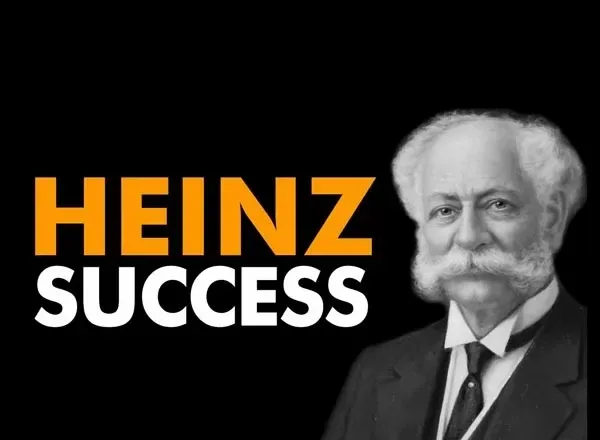The success story of Henry John Heinz, owner of the famous Heinz Company
The biographies of many famous American entrepreneurs all look the same as they all started from scratch, but thanks to perseverance and projects they became millionaires, and today we will talk about one of these successful businessmen, Henry John Heinz, founder of Heinz Ketchup, whose company today is one of the The largest food processing companies. For example, Heinz produced six out of ten bottles of ketchup consumed in the United States, while at the same time, the share of ketchup sales amounted to about 30% of the company's total sales. However, the company still produces a wide range of Other products as well.
Heinz's Childhood:
At the age of 21, John Heinz, along with other immigrant families, settled in the German immigrant stronghold of Pittsburgh, Pennsylvania, and decided to build his own brick factory and small business. 20 to the US from Hesse, Germany, Anna and John married and had six wonderful children, their first child being Henry John Heinz.
Henry John Heinz was born on October 11, 1844. The boy grew up surrounded by a studious family and began to gain experience in gardening at a very early age. The mother always spoke to Henry in German, and he learned German warnings, which remained one of his main qualities throughout his life. When Henry John Heinz reached the age of 6 years old, he started helping out with the house and garden, and at the age of 9, Henry named recipes for pickles and began selling homemade grated radishes in downtown Pittsburgh, and although there were many of his peers who worked as hard as him, Henry Heinz realized that he might be A good way to build a career.
When Henry reached the age of ten, the parents gave him 3,000 square meters of land, and at the age of 12, he had 12,000 square meters of land, perfect for growing vegetables on it. Gardening became the boy's passion and he would spend hours and days in the garden, sparing no effort and starting His harvest leads to a local grocer who sells vegetables and fruits to the people of Pittsburgh. Gradually, Henry expands his own business and soon begins selling grated Heinz radishes at the grocery whose taste was familiar to many locals, as Henry always used his mother's recipes.
When Henry J. Heinz graduated from high school, his garden had grown so large that he had to hire workers, and during 1861, when Henry was only 17 years old, he earned a decent amount of money for those days, $2,400 which in today's money About $43,000.
Henry's mother, Anne Margaret, always greeted him and supported him even in case of failure. She knew how to comfort her son and instill confidence in him. Being a very religious woman, his mother sincerely hoped that her son would become a priest so she brought him to the neighborhood Lutheran school. However, Henry was not interested in the practice. This is why he left Lutheran school and decided to go to business training at one of the top American financial colleges, Davies Business College, and Henry John Heinz funded his education on his own, using money collected from selling vegetables from his garden, In college, Haynes learned how to keep records and accounting books.
After graduating from Duff Commercial College, Henry started working in a brick factory with his father. He learned all the intricacies of this business, made some minor changes in brick production, and most importantly, he got a tax refund from the taxpayers. Suddenly, the father realized that he was counting on His son, who became an indispensable employee, Henry took up all the accounting work with great enthusiasm, and in 1864, 20-year-old Henry was running a brick factory almost single-handedly, and later, he even managed to expand production, while his father went to visit his relatives In Germany, meanwhile, brick building began to bring in a decent income, and soon the Heinz family was able to move from a small house into a villa made of bricks produced by the factory.
Heinz and his neighbor Clarence Noble:
Selling pre-packaged products was the right choice at that time, as the steel casting industry developed in Pittsburgh, and most men worked 12 hours a day, and therefore did not have time to cook, preferring to buy food that was ready for immediate consumption, and more than 60 companies picked up This trend and began to supply the market with various types of preserved products.
Henry John and Sarah Hines and the exploitation of their old home:
The company's revenues amounted to a few thousand dollars in the year of its establishment, but in order to survive in the fierce competition, it was necessary not only to provide consumers with high-quality products, but also to make them more available, so the production had to be massive, so the house was reorganized Heinz, which was left empty after the family moved into the villa, to produce Heinz & Noble in 1874, Henry hired several German housewives who were engaged in washing and canning vegetables, and during the spring, they reached an agreement to buy the entire crop from local farmers at a fixed price, with this The way, they also saved a lot of money because during bad weather conditions in the summer or fall the cost of vegetables might increase dramatically, and they also bought a vinegar production plant in St. Louis, Missouri and the company achieved great success, and Henry became a wealthy businessman, who could easily support his family.
And things were going well, and the young partners expected to get a big profit, but then they could not predict that it would happen, since in that year their company did not have enough working capital to cover the contracts with the farmers, and they thought that they could get a loan from A bank, but in 1875, the American financial crisis broke out, crippling the entire banking system, and they found themselves in the midst of 5,000 bankrupt establishments and all the property had to be sold in order to compensate for the farmers' losses.
The collapse of the company and its new breakthrough:
Henry Heinz used the money wisely and registered the Heinz Food Company in the names of his relatives (mother, cousin and brother John), and continued to produce and sell sauces and pickles and he was the head of the company. Heinz's business became a family business, and Henry would walk to his fields daily to check how things were going.
American National Sauce:
At first, Henry tried to make mustard, but in early 1876 he mastered the production of tomato sauce, which was later called ketchup, and by 1880, the Heinz ketchup bottle design began to take on its original shape.
Tomato sauce made from fresh tomatoes that Heinz grows in Pennsylvania fields (so everyone can be sure the selected tomatoes are used) has been a hit, and ketchup has made consumers happy, because it can improve the taste of a wide range of products from hot dogs to pasta.
Henry continued to expand the range of preserves, sauces, and marinades. Ketchup was followed by products such as sauces made from red and green peppers, chilies, apple juice, dip, olives, pickled onions, cauliflower, beans, and pickles. Henry began to regain confidence after his bankruptcy and at a time of economic crisis, when Heinz owed a large amount Of the money for the farmers and groceries of Pittsburgh, he promised to return them all to the last cent, and indeed when his revenues increased greatly, honest Henry gradually began to pay off his debts, and it took him five years to clear all these debts, and only after that, Henry Heinz became the legal owner of the company , moving its headquarters to Pittsburgh, Pennsylvania, United States.
Sarah Heinz's home:
Soon, the Hines family returned to the United States, and Sarah's condition did not improve after the trip, and her chest pain only increased, and Henry's wife gradually began a spiral of illness, and soon she died at the age of 51, and after the death of his wife, Henry built Sarah Hines' house for her memory, and today This home is a youth center (hosting a wide range of recreational and sporting events) and Henry never remarried.
Henry did not even think of stopping work at an old age, as he was still visiting the factory regularly, observing the progress of his work, and his grandchildren became his real happiness, so he had eleven of them, and they all loved traveling around the world with Grandpa Henry, as trips were always his passion, and he suffered Henry Heinz from pneumonia, died at the age of 74, and his employees raised the money and put up a memorial for him, which can still be found in the main building of the company, and before dying, Henry requested that a church be built in honor of his mother, and today, this church is located on the campus Pittsburgh.
Henry Heinz Legacy:







